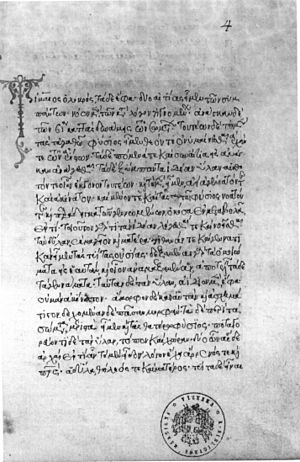Timaeus of Locri facts for kids
Timaeus of Locri (/taɪˈmiːəs/) was a character in two famous books by the ancient Greek philosopher Plato. These books are called Timaeus and Critias. In Plato's stories, Timaeus is shown as a wise thinker from the Pythagorean school.
If a real person named Timaeus of Locri ever lived, he would have been alive in the 400s BC. However, it's not certain if he was a real person because he only appears as a character in Plato's writings. Other old stories about him are either based on Plato's works or are made-up tales.
Contents
Was Timaeus a Real Person?
In Plato's books, Timaeus is described as a rich and important person from a Greek city called Lokroi Epizephyrioi. This city is now known as Locri in Calabria, Italy. Plato says Timaeus held important jobs in his hometown before coming to Athens, where the story of Timaeus takes place.
Plato doesn't directly say Timaeus was a Pythagorean, but he gives many clues. Timaeus seems to know a lot about all parts of ancient philosophy. He was especially good at understanding natural philosophy (how the world works) and astronomy (the study of stars and planets).
Ancient Beliefs About Timaeus
In ancient times, people generally believed Timaeus was a real person. For example, Cicero, a Roman writer, said that Plato traveled to Italy to learn from Timaeus and other Pythagoreans. Another writer, Macrobius, thought that Timaeus couldn't have talked with Socrates face-to-face because Socrates had died long before Timaeus's time.
Iamblichus, another ancient writer, listed Timaeus as an important member of the Pythagorean school. Diogenes Laërtius, who wrote about famous philosophers, suggested that Plato's character of Timaeus was based on a real Pythagorean named Philolaus.
Modern Views on Timaeus
Today, most experts think Timaeus was probably not a real person. They believe he was a character Plato created. Plato might have based Timaeus on features of real Pythagoreans he knew, like Archytas.
The main reason for this idea is that there's no information about Timaeus that doesn't come from Plato's books. However, some argue that most characters in Plato's books were indeed real people.
The Book On the Nature of the World and the Soul
There is an old book written in Doric Greek called On the Nature of the World and the Soul. It is also known as the Timaeus Locrus because people thought Timaeus of Locri wrote it. The book begins by saying, "Timaeus of Locri said the following." It then summarizes the ideas that Timaeus talks about in Plato's Timaeus. This book has been saved and exists in more than fifty copies.
The book mostly agrees with Plato's ideas. However, it does not mention Plato's Theory of Forms, which is a key part of his philosophy.
History of the Book
The book On the World and the Soul was first mentioned by writers in the 100s AD. In ancient times, no one doubted that Timaeus had written it. Some even believed it was the main source for Plato's own book. There was a rumor from the 200s BC that Plato had copied his Timaeus from a Pythagorean book. This rumor became linked to On the World and the Soul.
Modern Discoveries About the Book
Modern studies of old texts have shown that On the World and the Soul was not written by Timaeus. It was written by someone else, probably between the 100s BC and the 100s AD. This means it was written after Plato's Timaeus, and it is based on Plato's work, not the other way around.
The writer of On the World and the Soul used simpler language and just presented conclusions instead of arguments. It also doesn't have any dialogue. This suggests it might have been a summary of Plato's difficult original book, perhaps for use in a classroom. It often skips the harder parts of Plato's Timaeus instead of explaining them. Some ideas in On the World and the Soul are hard to understand without knowing Plato's work first.
The book also shows signs of ideas from a later period of Platonism, called Middle Platonism. This makes it likely that the author lived in Alexandria, Egypt. The author also updated Plato's ideas about nature by including new discoveries from Hellenistic astronomy and medicine.
Other Works Attributed to Timaeus
Some old sources say that Timaeus of Locri wrote a book called Mathēmatiká. We don't know anything else about this book. This might be a mistake, confusing Timaeus with an astronomer who had the same name.
He is also said to have written a story about the life of Pythagoras. However, this might be a confusion with a historian named Timaeus of Tauromenium. That historian did write about Pythagoras's life and work.
See also
 In Spanish: Timeo para niños
In Spanish: Timeo para niños
- List of speakers in Plato's dialogues
 | Charles R. Drew |
 | Benjamin Banneker |
 | Jane C. Wright |
 | Roger Arliner Young |


